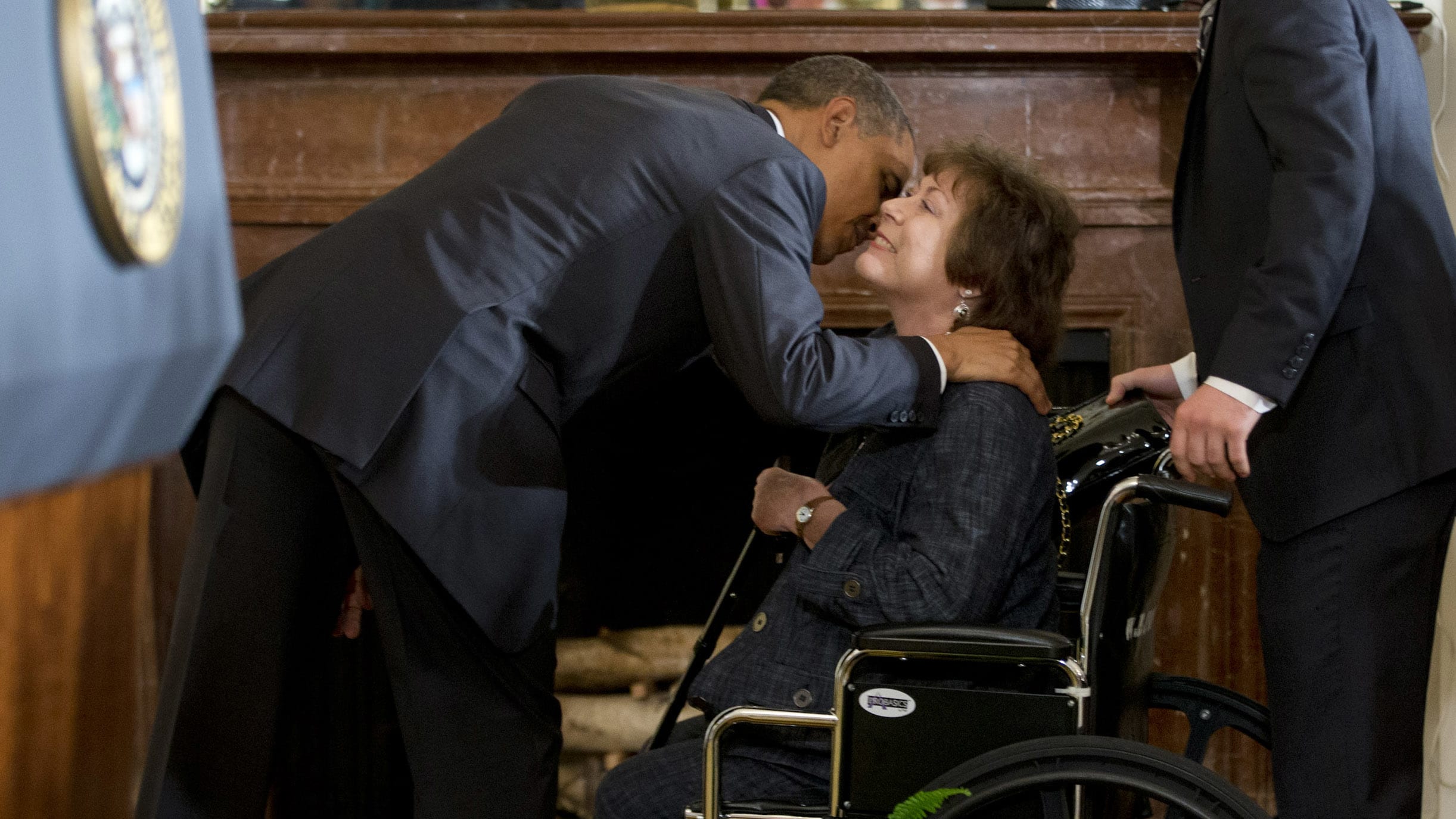Natoma Canfield, woman who became face of the Affordable Care Act, dies at 61


A free daily email with the biggest news stories of the day – and the best features from TheWeek.com
You are now subscribed
Your newsletter sign-up was successful
Natoma Canfield, the Ohio woman whose letter to former President Barack Obama about her struggles to pay insurance premiums inspired him to fight for the Affordable Care Act, has died. She was 61.
Canfield, a resident of Medina Township, died on June 18. In late 2009, she wrote a letter to Obama, telling him that she was a cancer survivor and because her premiums kept skyrocketing every year, she could no longer afford to pay for health insurance. Canfield shared with Obama that she was worried about becoming sick again, as well as losing her home. Her letter moved Obama, and he read it to insurance executives during a meeting at the White House.
Canfield soon found herself the face of the Affordable Care Act, with Obama using her story to illustrate how hard it could be for people to afford health insurance, especially those who were sick. "I carried Natoma's story with me every day of the fight to pass the law," Obama said in 2012. "It reminded me of all the Americans, all across the country, who have had to worry not only about getting sick, but about the cost of getting well."
The Week
Escape your echo chamber. Get the facts behind the news, plus analysis from multiple perspectives.

Sign up for The Week's Free Newsletters
From our morning news briefing to a weekly Good News Newsletter, get the best of The Week delivered directly to your inbox.
From our morning news briefing to a weekly Good News Newsletter, get the best of The Week delivered directly to your inbox.
She was in the hosptial when Obama signed the ACA into law, but Canfield's sister Connie attended the event in her place. Obama framed Canfield's letter and placed it in the Oval Office, and she was eventually able to visit Washington to see it in person. Obama tweeted on Wednesday that by telling her story, Canfield "helped us pass the Affordable Care Act. She was an inspiration to me and so many others, which is why her letter still hangs in my office. Michelle and I send our condolences to Natoma's family."
A free daily email with the biggest news stories of the day – and the best features from TheWeek.com
Catherine Garcia has worked as a senior writer at The Week since 2014. Her writing and reporting have appeared in Entertainment Weekly, The New York Times, Wirecutter, NBC News and "The Book of Jezebel," among others. She's a graduate of the University of Redlands and the Columbia University Graduate School of Journalism.
-
 The ‘ravenous’ demand for Cornish minerals
The ‘ravenous’ demand for Cornish mineralsUnder the Radar Growing need for critical minerals to power tech has intensified ‘appetite’ for lithium, which could be a ‘huge boon’ for local economy
-
 Why are election experts taking Trump’s midterm threats seriously?
Why are election experts taking Trump’s midterm threats seriously?IN THE SPOTLIGHT As the president muses about polling place deployments and a centralized electoral system aimed at one-party control, lawmakers are taking this administration at its word
-
 ‘Restaurateurs have become millionaires’
‘Restaurateurs have become millionaires’Instant Opinion Opinion, comment and editorials of the day
-
 Trump HHS slashes advised child vaccinations
Trump HHS slashes advised child vaccinationsSpeed Read In a widely condemned move, the CDC will now recommend that children get vaccinated against 11 communicable diseases, not 17
-
 FDA OKs generic abortion pill, riling the right
FDA OKs generic abortion pill, riling the rightSpeed Read The drug in question is a generic version of mifepristone, used to carry out two-thirds of US abortions
-
 RFK Jr. vaccine panel advises restricting MMRV shot
RFK Jr. vaccine panel advises restricting MMRV shotSpeed Read The committee voted to restrict access to a childhood vaccine against chickenpox
-
 Texas declares end to measles outbreak
Texas declares end to measles outbreakSpeed Read The vaccine-preventable disease is still spreading in neighboring states, Mexico and Canada
-
 RFK Jr. shuts down mRNA vaccine funding at agency
RFK Jr. shuts down mRNA vaccine funding at agencySpeed Read The decision canceled or modified 22 projects, primarily for work on vaccines and therapeutics for respiratory viruses
-
 Measles cases surge to 33-year high
Measles cases surge to 33-year highSpeed Read The infection was declared eliminated from the US in 2000 but has seen a resurgence amid vaccine hesitancy
-
 Kennedy's vaccine panel signals skepticism, change
Kennedy's vaccine panel signals skepticism, changeSpeed Read RFK Jr.'s new vaccine advisory board intends to make changes to the decades-old US immunization system
-
 Kennedy ousts entire CDC vaccine advisory panel
Kennedy ousts entire CDC vaccine advisory panelspeed read Health Secretary RFK Jr. is a longtime anti-vaccine activist who has criticized the panel of experts
